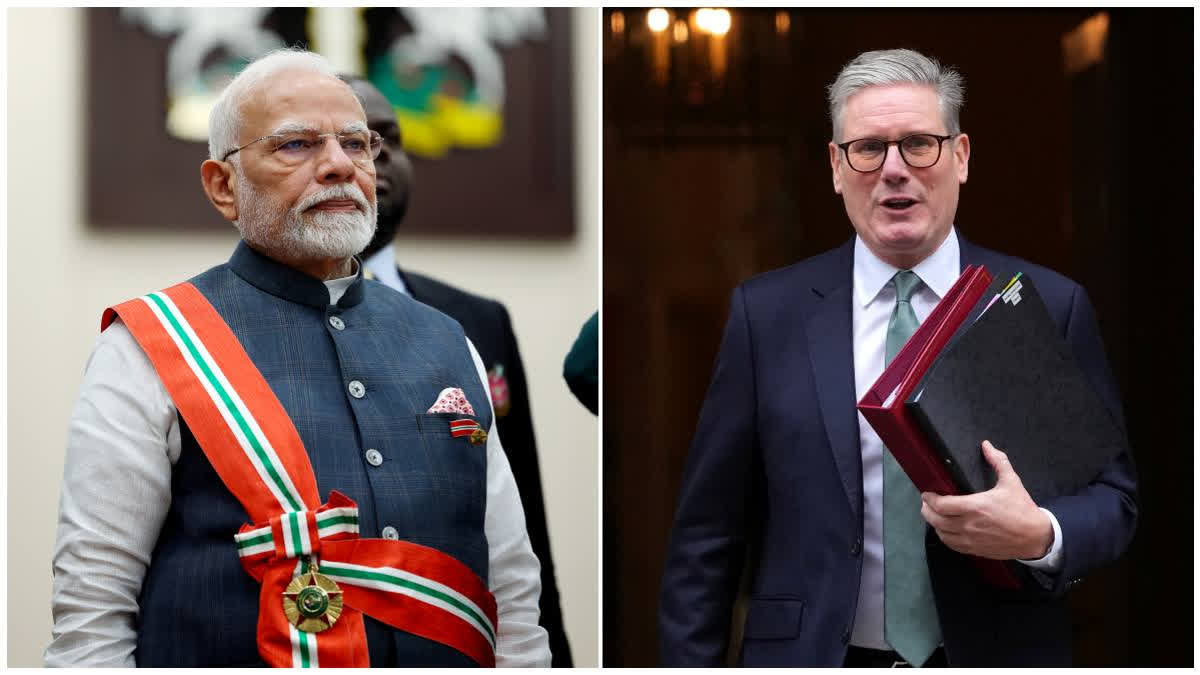London: UK Prime Minister Keir Starmer has announced that trade talks with India would be relaunched in the new year, following a bilateral meeting with his Indian counterpart Narendra Modi on the sidelines of the G20 Summit in Brazil.
Following Starmer and Modi's meeting, Downing Street said the UK would seek a new strategic partnership with India, including a trade agreement as well as deepening cooperation in areas such as security, education, technology and climate change.
Starmer's spokesperson said the UK was committed to negotiating a trade deal with India, one of the fastest-growing economies in the world.
"A new trade deal with India will support jobs and prosperity in the UK -- and represent a step forward in our mission to deliver growth and opportunity across our country," a statement released by 10, Downing Street, quoted Starmer as saying after the bilateral meeting. Modi took to social media to describe the exchange as "extremely productive".
"For India, the Comprehensive Strategic Partnership with the UK is of immense priority. In the coming years, we are eager to work closely in areas such as technology, green energy, security, innovation and technology," Modi said in a post on X.
"We also want to add strength to trade as well as cultural linkages," he added. India's Ministry of External Affairs (MEA) also said the bilateral meeting infused "fresh impetus to the India-UK Comprehensive Strategic Partnership".
"Prime Minister Narendra Modi met Prime Minister Keir Starmer of the UK on the sidelines of the G20 Brazil Summit in Rio. The leaders discussed various facets of the India-UK Comprehensive Strategic Partnership. They also acknowledged the need for a balanced and mutually beneficial FTA," the MEA said in its post on X.
Meanwhile, Downing Street highlighted that Starmer was using his trip to Brazil for the G20 Summit to strengthen ties with the world's leading economic powers to drive growth and deliver for the British people.
The meeting with Modi came shortly after Starmer's meeting with Chinese President Xi Jinping and talks with Japan Prime Minister Shigeru Ishiba and Australian Prime Minister Anthony Albanese.
On the India-UK trade talks, Downing Street revealed the Department for Business and Trade (DBT) would soon unveil the government's new trade strategy that would be aligned with its industrial strategy to help inform all future trade negotiations and achieve long-term sustainable, inclusive and resilient growth through trade.
"India is the fifth largest economy in the world and a vital trading partner for the UK. We believe there is a good deal to be done here that works for both nations," said UK Business and Trade Secretary Jonathan Reynolds.
"Whether it's lowering Indian tariffs to help British firms export to this dynamic market or boosting investment which already supports over 6,00,000 jobs across both countries, striking a deal is important to deliver this government's core mission of driving economic growth," he said.
India and the UK have been negotiating a Free Trade Agreement (FTA) since January 2022, with talks paused during general elections in both countries earlier this year. According to the latest statistics, the bilateral trade relationship was worth GBP 42 billion in the 12 months to June. An FTA is expected to significantly boost the figure.
The Labour Party government in the UK is keen to highlight a trade friendly message as a means to deliver a strong economy at home.
The DBT had announced the Starmer-led government's commitment to relaunching talks with all FTA partners shortly after the Labour Party won the July general elections. Since then, negotiations have been kickstarted with the Gulf Cooperation Council, Switzerland and South Korea, with the UK also set to join the Comprehensive and Progressive Agreement for Trans-Pacific Partnership on December 15.
While officials on the Indian side had already expressed their readiness to resume FTA negotiations from the stalled fourteenth round, this announcement of a new year start for the talks is the first clear signal of a timeframe from the British side.



